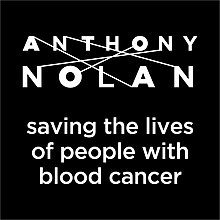Anthony Nolan
 |
|
| Formation | 1974 |
|---|---|
| Legal status | Registered charity |
| Purpose | Health care in the UK |
| Location |
|
|
Region served
|
UK |
|
Chief Executive
|
Henny Braund |
| Website | AnthonyNolan.org |
Anthony Nolan is a UK charity that works in the areas of leukaemia and hematopoietic stem cell transplantation. It manages and recruits donors to the Anthony Nolan Register, which is part of an aligned registry that also includes the Welsh Bone Marrow Donor Registry, and the National Blood Service ran British Bone Marrow Registry. This aligned register is known as the Anthony Nolan & NHS Stem Cell Registry. It also carries out research to help make bone marrow transplants more effective.
The charity is named after Anthony Nolan (born 1971–died 1979), who did not suffer from leukaemia but from Wiskott-Aldrich syndrome, a rare inherited blood disorder. It was founded by Anthony's mother Shirley Nolan (1942–2002) in 1974 as the Anthony Nolan Register.
Initially based at the Westminster Children's Hospital, it moved to St Mary Abbot's Hospital in 1978 and to its present offices, laboratory and research institute in north London, in the grounds of the Royal Free Hospital. The charity was renamed in 2001 as the Anthony Nolan Trust. and again in 2010 to Anthony Nolan. In 2008 Anthony Nolan set up the UK's first dedicated cord blood bank, allowing mothers to safely donate the blood from their umbilical cord and placenta after they give birth, the charity then use this blood in their stem cell transplants. In 2012 Anthony Nolan became the first stem cell register in the world to start recruiting 16-year-olds.
Today the trust register has over 500,000 potential donors on it. One of the charity's main aims is to recruit more male donors, as they are the most likely to be chosen by doctors to donate, and are selected for 80% of donations.
A student organisation operating in universities throughout the UK known as 'Marrow' works with Anthony Nolan to recruit potential donors to the register and raise awareness of the charity and blood cancers within universities and their local communities. It was set up in 1998 at Nottingham University and now operates in around 50 universities in the UK and worldwide.
...
Wikipedia
